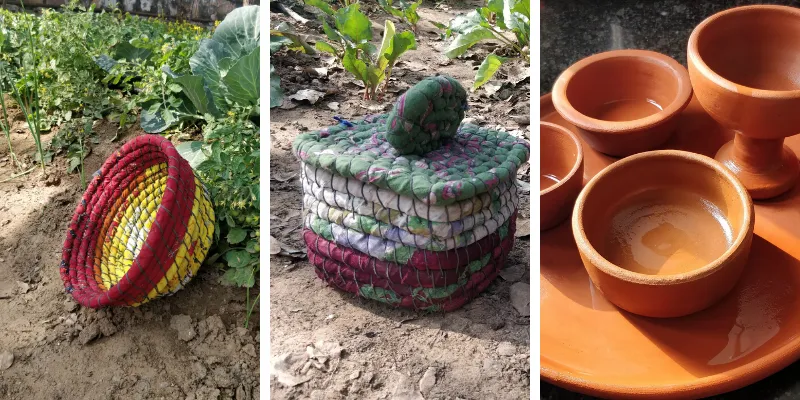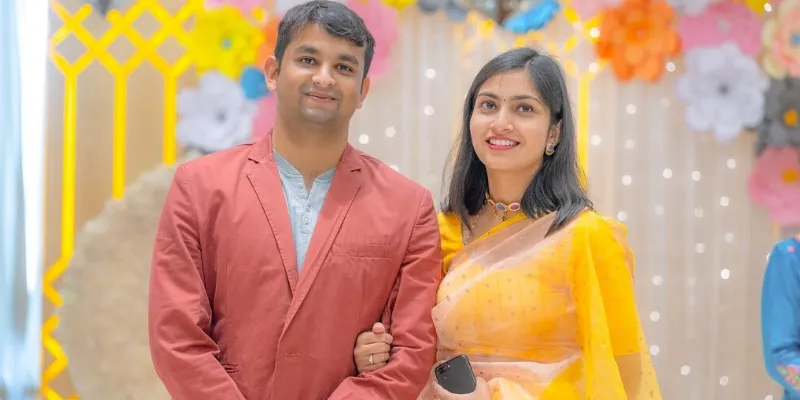This woman entrepreneur started a crafts business with Rs 5 lakh and is all set to see a turnover of Rs 1 Cr in a year
Jaipur-based engineer couple Purnima and Chinmay gave up their cushy jobs and revived a dying crafts art of making papier-mache products and grass baskets. Today, their initiative has empowered women from five villages in Rajasthan.
Inspired by the ‘Make in India’ dream, an engineer couple from Jaipur have scripted a success story in the crafts sector.
Purnima Singh and her husband Chinmay Banthia left their cushy corporate jobs to start Shubham Crafts to empower unskilled women from villages to make papier mache products and grass baskets. Shubham Crafts, which was started with an investment of Rs 5 lakh, is all set to see a turnover of Rs 1 crore this year.

The founders of Shubham Crafts, Purnima and Chinmay, are both engineering graduates from NIT Kurukshetra. While Purnima worked for three years in Petrofac Engineering Services, Chinmay worked for Mu-Sigma.
Reaching out
Purnima says: “I always have this habit of talking to house help, rickshaw drivers, vegetable and fruit-sellers, etc., and understand both their businesses and way of living. I wanted to do something to support the marginalised sections of the society. This was the agenda behind Shubham Crafts.”
The couple decided to focus on papier mache handicrafts, and for this they identified a few villages in Rajasthan where they could train women in the craft. The women were first provided with skill training and then inducted into the production team.
“Papier mache products are a piece of art which has been revived by these rural women. The artwork is hand-drawn, a reminder of the lost skill of rural folks of Jaipur,” she says.
The product range includes natural grass baskets, an alternative to plastic or metal, and terracotta products.

Empowering village women
Shubham Crafts was started with three unskilled women, and today has 35 skilled home-grown papier mache women artists from five villages. It’s a B2B business with products sold directly to wholesalers of home décor and big-size retail chains.
The venture has played a key role in empowering women who are now confident of their skill and have become financially independent.
“We have grown from a company with a turnover of Rs 20,000 to Rs 1 crore in a span of one financial year, says Purnima, adding, “We have been able to convert more than half a million tonnes of waste into useful products loved by buyers from all across Europe and USA.”
The response to the products has been overwhelming, says Purnima. In just one-and-a-half-years of its launch, Shubham Crafts has done business with clients in Europe, Canada, North America, Australia, New Zealand, South Korea, and Singapore.
Changing mindsets
The biggest challenge, according to Purnima, has been to get women out of the confines of their villages and also change their mindsets.
“Another big challenge was the fight for the basics. It took us three months to get an electricity connection after daily visits to the office of the assistant engineer of the electricity board. Also, when we searched for raw material, we realised that even waste was expensive. Everywhere there is a syndicate whose chain you cannot get into. But after a lot of effort, we were able to find suppliers,” she adds.
Exciting opportunities

Chinmay and Poornima
The future is filled with exciting new possibilities, says Purnima. “We change our product line in every exhibition. This implies a permutation of 700 different styles and material. In the future, we wish to expand our team, impact more lives of rural women, and grow in terms of revenue to expand our manufacturing facility to other rural areas. The growth in the team, skill, and production scale directly implies readiness for more business volume.”
Purnima says, “To the product portfolio, we have added small stone carvings from wasted stones, and terracotta based on client demand. We have started making grass baskets out of the notorious ‘Parali’, which is burnt in huge scale in Haryana and Punjab during harvesting, suffocating Delhi at least twice a year,” she adds.
(Edited by Javed Gaihlot)









